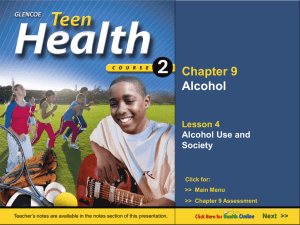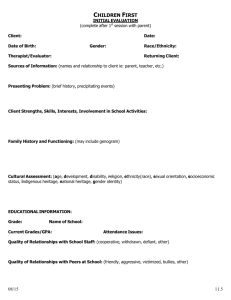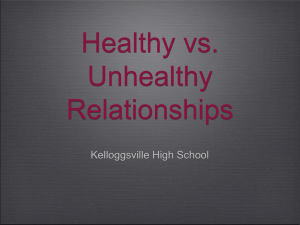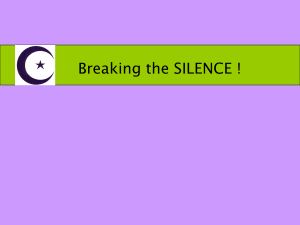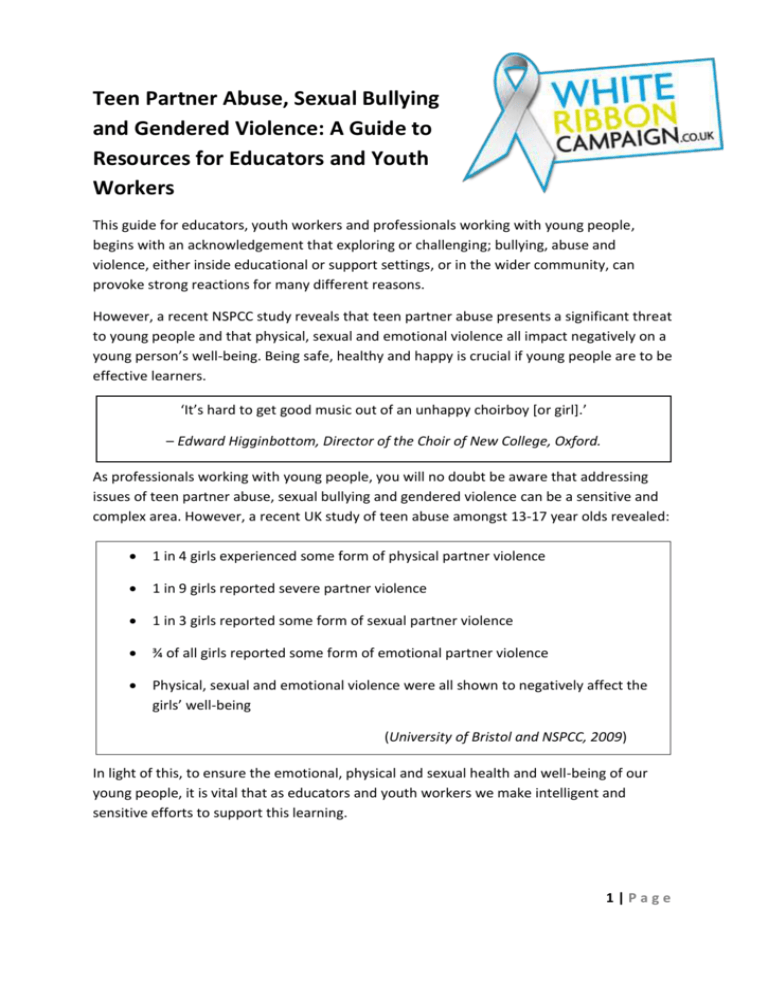
Teen Partner Abuse, Sexual Bullying
and Gendered Violence: A Guide to
Resources for Educators and Youth
Workers
This guide for educators, youth workers and professionals working with young people,
begins with an acknowledgement that exploring or challenging; bullying, abuse and
violence, either inside educational or support settings, or in the wider community, can
provoke strong reactions for many different reasons.
However, a recent NSPCC study reveals that teen partner abuse presents a significant threat
to young people and that physical, sexual and emotional violence all impact negatively on a
young person’s well-being. Being safe, healthy and happy is crucial if young people are to be
effective learners.
‘It’s hard to get good music out of an unhappy choirboy [or girl].’
– Edward Higginbottom, Director of the Choir of New College, Oxford.
As professionals working with young people, you will no doubt be aware that addressing
issues of teen partner abuse, sexual bullying and gendered violence can be a sensitive and
complex area. However, a recent UK study of teen abuse amongst 13-17 year olds revealed:
1 in 4 girls experienced some form of physical partner violence
1 in 9 girls reported severe partner violence
1 in 3 girls reported some form of sexual partner violence
¾ of all girls reported some form of emotional partner violence
Physical, sexual and emotional violence were all shown to negatively affect the
girls’ well-being
(University of Bristol and NSPCC, 2009)
In light of this, to ensure the emotional, physical and sexual health and well-being of our
young people, it is vital that as educators and youth workers we make intelligent and
sensitive efforts to support this learning.
1|Page
Guidance for Professionals
White Ribbon Campaign UK recognises that you are the experts on the young people with
whom you work. Some of these resources will work well with one group of young people, in
one setting and less well in another. Therefore, when choosing a resource, we recommend:
1. Fully familiarising yourself with the resource. For example, if it is a film watch it all
the way through.
2. Consider how your young people will react to the content of the resource. For
example, is it likely to provoke strong reactions and, if so, how can these best be
managed.
3. Consider whether it would be advisable to liaise with colleagues before using the
resource or have it pre-approved by your line manager.
4. Consider whether you need to consult with parents or carers before using the
resource.
5. Consider whether the resource is appropriate for the age group with whom you
work.
6. Consider whether you need to adapt the resource in any way so that it better meets
the needs of the group or individuals you are working with.
7. Consider whether you are prepared to deal with any disclosures arising from the
work (see Tender’s guidance on how to deal with children who make disclosures of
abuse at:
http://www.tender.org.uk/files/Guidance%20On%20Responding%20To%20A%20C
hild%20Disclosing%20Abuse%20compressed.PDF )
8. Consider whether you are prepared to signpost students to other agencies and
sources of support (see our Guide to Sources of Support).
2|Page
Resources for work with Teenagers
The following resources have been found to be helpful and informative by White Ribbon
Campaign UK and its partner groups.
Expect Respect Toolkit
The Expect Respect Toolkit by Women’s Aid consists of one easy to use
core lesson for each year group from Reception to Year 13. It can be
used in a variety of settings such as youth clubs and play schemes as well
as schools. The lesson plans and resources are mapped to the curriculum
and are based on themes which have been found to be effective in
tackling domestic abuse. Available at:
http://www.womensaid.org.uk/page.asp?section=0001000100280001&sectionTitle=Educ
ation+Toolkit
Expect Respect: A Toolkit for addressing Teenage Relationship Abuse
in Key Stages 3, 4 and 5
Expect Respect: A Toolkit for addressing Teenage Relationship Abuse in Key
Stages 3, 4 and 5 by Women’s Aid contains teachers’ notes, six lesson plans
and supporting resources and is designed to challenge the attitudes of
teenagers to violence and abuse in relationships. Available at:
http://www.womensaid.org.uk/page.asp?section=0001000100280001&sectionTitle=Educ
ation+Toolkit
Spiralling
Spiralling by Bristol Domestic Abuse Forum is an educational film and
toolkit which offers activities for children aged 4 to adults designed to
prevent relationship abuse in the next generation. It enables learners
to; recognise safe and potentially abusive relationships, know how to
help themselves and support their friends, develop conflict resolution
skills, have respectful, trusting and equal relationships and understand
the law and how it can protect victims. Spiralling can be used in a wide
range of education and support settings. Available at:
http://www.bdaf.org.uk/professionals/spiralling-dvd-and-toolkit
3|Page
Crush
Crush by the Scottish Government is a short film lasting 28
minutes, divided into chapters, which supports students
through an exploration of teen partner abuse, gender
stereotyping and bullying and the issues these present for
young people. It is accompanied by Crush: A Teaching
Resource Pack containing; lesson plans, supporting
materials and printable resources to accompany the film
and contextualise its content. Available at:
http://www.dartsscotland.org/resources/teachingresources/view/86/crush
Respect Not Fear
Respect Not Fear by Nottinghamshire Domestic Violence
Forum is an interactive website enabling learning on healthy
and unhealthy relationships, including; an activity called
Consent and Consequence which uses scenarios experienced
by young people, to explore the emotional, health and legal
consequences of different courses of action and a Pyramid
Game helps young people reflect what they value in a
relationship. The site contains information on gendered
violence such as; forced marriage, honour-based violence
and forced genital mutilation (FGM). Available at:
http://www.respectnotfear.co.uk/
Get Savi: Students Against Violence Initiative
Get Savi is a bystander intervention project developed by
Scottish Women’s Aid and Scottish White Ribbon which
uses the model of successful American bystander
education projects such as Green Dot Project at the
University of Kentucky and Bringing in the Bystander at the
University of New Hampshire. Get Savi was developed in response to the Hidden Marks
Report revealing the extent of violence against women and girls within universities. Get Savi
is presented as a resource pack complete with a six session scheme of learning and lesson
plans. Its content is aimed at students, but can be adapted for use with younger teenagers.
Available at: http://togetherwecanstopit.org/get-savi-resources/
4|Page
Hip Hop: Beyond Beats and Rhymes
Hip Hop: Beyond Beats and Rhymes is a 50 minute documentary, by self-proclaimed Hip Hop
Head and Mentor in Violence Prevention, Byron Hurt. In it, he presents a “loving critique” of
Hip Hop music, paying tribute to the power and creativity of Hip Hop music, whilst
questioning its representations of masculinity, violence against women and homophobia.
This film does contain adult content. It is
supported by a resource guide containing
various activities and a discussion guide.
Available at:
http://video.google.com/videoplay?docid=2020029531334253002 and:
http://archive.itvs.org/outreach/hiphop/
This is Abuse
This is Abuse is an interactive website created by the Home Office which enables young
people to understand that abuse is more than just physical violence and spot warning signs
of emotional, psychological and sexual abuse through celebrity interviews, short films and
FAQs. It enables potential victims of teen
partner abuse to question their partner’s
behaviour and potential perpetrators to
question their own conduct. It also has
comprehensive information on further sources
of support. Available at:
http://thisisabuse.direct.gov.uk/
Is Your Partner Treating You Properly?
Is Your Partner Treating You Properly? by NHS Choices
explains that abuse goes beyond physical violence
including emotional and verbal abuse and other forms
of control. It challenges the myths that surround the
normalisation of abusive behaviour, explains the effects
of abuse on the victim and asserts that there is no
excuse for abusive behaviour. It contains information on
how to support a friend and gives information on
support services for victims and perpetrators. Available
at: http://www.nhs.uk/Livewell/teengirls/Pages/relationshipviolence.aspx
5|Page
Teens Health
Teens Health by Nemours is an American site
which still could be useful for young people in
the UK. Using a conversational tone it discusses
what makes a relationship healthy or unhealthy,
using “real life” examples of how caring or
abusive behaviours present themselves in
relationships. It encourages young people to
look for those qualities they value in their friendships in their relationships and to foster
those same qualities in themselves. It also supports learning around understanding warning
signs and different forms of abuse. Available at:
http://kidshealth.org/teen/your_mind/relationships/healthy_relationship.html
Linking Lies: Sexual Bullying and Gender Conflict
Linking Lies: Sexual Bullying and Gender Conflict is a resource
pack developed by Lewisham College in collaboration with AntiBullying Alliance (London region). It consists of a film and staff
guide containing important information on the issues of sexual
bullying and gender conflict and a number of activities for use
before, during and after viewing the film. It is for use with 14-19
year olds, at the teacher’s discretion, in schools, colleges and
other youth settings. Available at:
http://www.excellencegateway.org.uk/page.aspx?o=325268
Pleasure Vs Profit: Growing Up in Pornified Scotland
Pleasure Vs Profit: Growing Up in Pornified Scotland is a 10 minute film and information
pack containing further ideas on how we can challenge “porn culture”. Created by Zero
Tolerance and the Women’s Support Project, with input from police, activists and young
people, it exposes the porn industry’s manipulation of young people’s natural curiosity
about sex, potentially preventing them from exploring their sexuality at their own pace and
in their own way. Whilst this film focuses on
Scotland, it would be equally useful in other parts of
Britain. Available at:
http://www.zerotolerance.org.uk/pleasurevsprofit
6|Page
Boys Don’t Cry
Boys Don’t Cry (1999) tells the story of Brandon Teena who arrives
in a small Nebraska town. Brandon soon makes friends and begins a
relationship with a local girl named Lana. As the story progresses,
the audience discovers that Brandon is wanted in other states for
Grand Theft Auto and that he was born a woman named Teena
Brandon. When some of his new friends find out his secret, Brandon
faces violence and abuse. It could be used to support work on
gender, identity and gendered violence with older teenagers. This
film includes a rape scene, violence and drug use. Please observe
the BBFC guidance with regards to showing this film to audiences.
Heathers
In Heathers (1989) Veronica maintains her popularity
through her association with a clique of girls all named
Heather. The Heathers are vain, shallow and cruel and
Veronica often wishes them dead. A school newcomer
named Jason Dean sets out to fulfil Veronica’s wish. This film
can be used to support work on bullying and the social
politics of schools. Please observe the BBFC guidance with
regards to showing this film to audiences.
Mean Girls
Mean Girls (2004) tells the story of Cady Heron who arrives in a new
school and is a hit with a clique of teenage girls named the Plastics.
Having been home-schooled and raised in the African bush, Cady
struggles to maintain her loyalties to her new friends and preserve her
popularity with the Plastics. This film could be used to open a discussion
on themes of bullying and unwritten social rules within schools. Please
observe the BBFC guidance with regards to showing this film to
audiences.
7|Page
Paper Heart
Paper Heart (2009) weaves together documentary and
fantasy. American comedian, Charlyne Yi sets out to make
a documentary about love and talks to everyone from
scientists to Hell’s Angels in order to get some insights.
Along the way, she begins a relationship with the actor
Michael Cera. This film could be used to introduce learning
on love and relationships. Please observe the BBFC
guidance with regards to showing this film to audiences.
Precious
In Precious (2009) Claireece Precious Jones is abused by her
mother for whom she acts as a carer and becomes pregnant by
her father. She is poor and virtually illiterate and, in order to
cope with the hardships of her life, she seeks refuge in a rich
fantasy life. Claireece then meets a new teacher who
encourages her to tell her own story in her own words. This
film can be used to open a discussion on bullying and abuse
and the effects of abuse on a young person. Please observe the
BBFC guidance with regards to showing this film to audiences.
Provoked: A True Story
In Provoked: A True Story (2006) Kiranjit Ahluwalia is imprisoned for
killing her abusive husband. Having been poorly treated by the police
and the judicial system, Kiranjit finds a sense of freedom in prison
and strikes up a friendship with a fellow inmate, named Veronica
Scott. Meanwhile, Southall Black Sisters campaign for Kiranjit’s
release. This film is a realistic portrayal of a violent marriage and its
aftermath and, as such, contains graphic scenes of violence. Please
observe the BBFC guidance with regards to showing this film to
audiences.
8|Page
The Color Purple
The Color Purple (1985) tells the story of Celie a poor, black girl growing
up in the Deep South in the early 20th century. Celie is raped and falls
pregnant by the man she thought of as her father. Her baby is taken from
her and she is forced into a loveless and abusive marriage. Over many
years, Celie finds female friendship, solidarity and the strength to
challenge abuse and prejudice. This film could be used to support debate
around racism, sexuality and abuse. Please observe the BBFC guidance
with regards to showing this film to audiences.
Time
Time a video by Chase and Status featuring
Delilah has been made alongside Refuge
and shows a realistic story of domestic
abuse between a man and a woman and
the effects on their two daughters. It shows
the emotional rollercoaster of being with an
abusive man who often can present as a
loving person. It invites the viewer to
imagine the emotions and perspectives of all the characters. This story is presented
alongside current dance music which makes it easy for young people to access. Available at:
http://www.youtube.com/watch?v=lWP9VvkeTmA
Love the way you Lie
Love the way you Lie by Eminem featuring
Rihanna is a music video that shows the
emotions involved in an abusive relationship
for both victim and perpetrator. It could be
used to begin a consideration of these
issues by learners and promote discussion.
Similarly the lyrics could be used as a means
of scaffolding discussions leading to deep
learning. The song does include some swearing and should be used with discretion.
Available at: www.youtube.com/watch?v=uelHwf8o7_U&ob=av3e
9|Page
We Are Man- End Violence Against Women
We Are Man – End Violence Against Women is a video that shows men
behaving in a “jackass” way, but then taking a positive stance and
challenging street harassment and rape. Available at:
http://www.youtube.com/watch?v=ZYhaodUPqSU
Five Bottles of Shampoo
Five Bottles of Shampoo is a rap poem by The King Blues in which
he challenges men’s abuse of women, the judicial system’s failure
to convict rapists and the rigid ideas of femininity promoted by the
media and consumerism. The poem does include swearing and
should be used with discretion. Available at:
http://www.youtube.com/watch?v=XJrzIJTtXT4
This list is by no means exhaustive and should you have any suggestions of resources for
tackling; teen partner abuse, sexual bullying or gendered violence, that you have found
particularly useful when working with young people, please let us know. Your feedback is
welcomed.
White Ribbon Campaign UK
Address: White Ribbon House, 1, New Road, Mytholmroyd, Hebden
Bridge, West Yorks, HX7 5DZ.
Tel: 01422 886545
Website: www.whiteribboncampaign.co.uk
Email: info@whiteribboncampaign.co.uk
Registered Charity: 1123874
10 | P a g e

